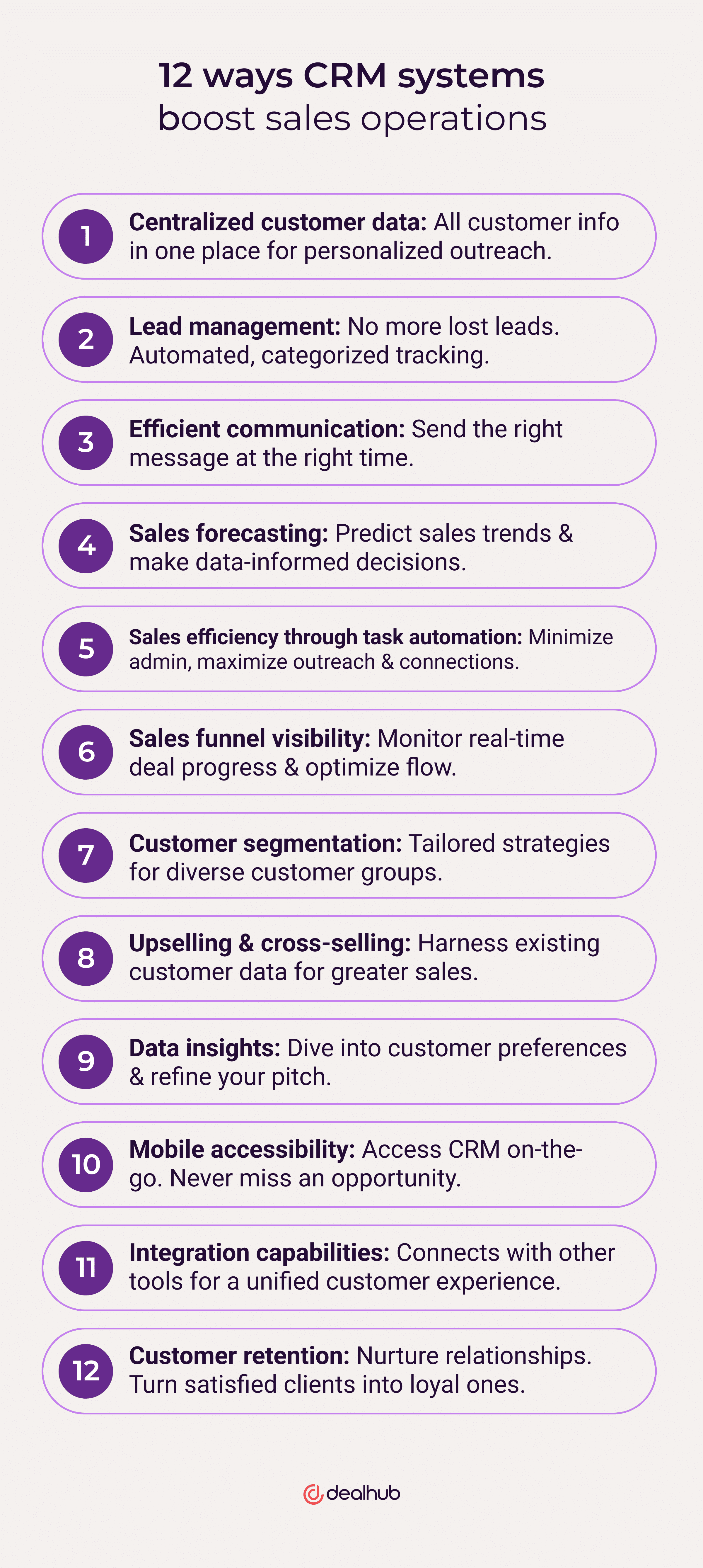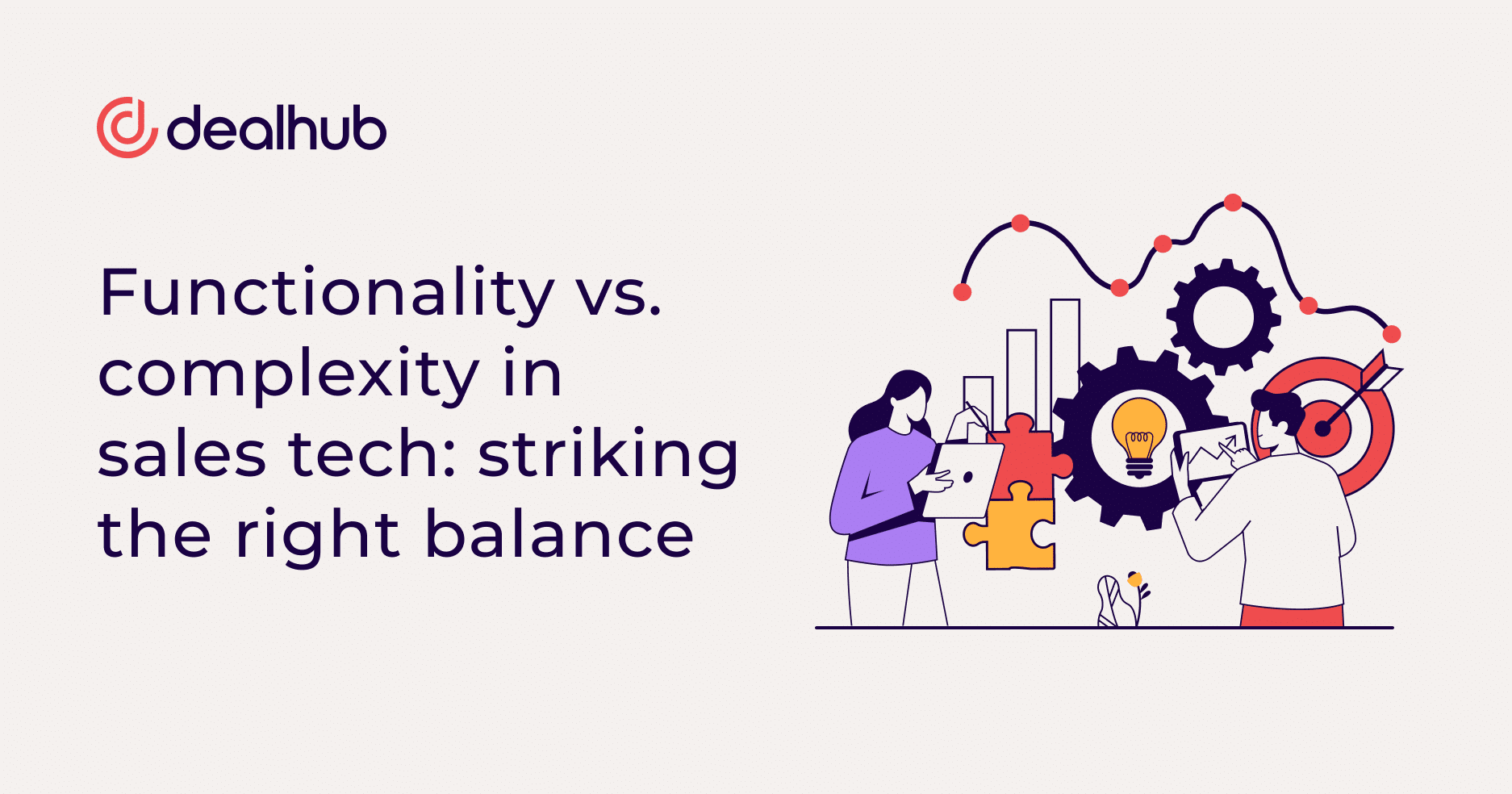Juggling leads and managing clients can be a complex, time-intensive task. Yet, there’s a method to mastering it without neglecting potential leads or pursuing ill-fitted prospects. Dive into our blog, where we uncover the pivotal role CRM systems occupy in the realm of modern sales operations (SalesOps).
Discover how embedding customer relationship management isn’t just essential—it’s the backbone of sales triumph. We’ll shed light on:
- How CRMs tackle prevalent challenges, enhancing lead management.
- The transformative impact of CRMs in crafting targeted engagement strategies driving sales.
- The hurdles SalesOps often encounters and the CRM-powered solutions to these issues.
- An exploration of 12 game-changing ways CRMs redefine sales operations.
- Tips to finetune your CRM, propelling sales achievements.
Let’s jump right in!
The handshake between customer relationship management and sales operations
A harmonious partnership between customer relationship management and sales operations is not just a nice-to-have; it’s a must-have for sales success in today’s competitive landscape. After all, sales isn’t just about selling products anymore – it’s about building a relationship with each and every client. Without the help of a CRM, that can be a big lift!
SalesOps teams often grapple with several challenges, including:
- Managing vast amounts of customer data
- Keeping track of leads
- Maintaining efficient communication
- Making accurate sales forecasts
- Automating repetitive tasks
Think of CRM systems as digital administrative assistants – working hard behind the scenes so that a sales representative (the “face” of the company) can appear organized, knowledgeable, and ready to problem solve on the client’s behalf.
By seamlessly integrating CRM into sales operations, businesses can improve efficiency, customer relationships, and, most importantly, their bottom line. CRM systems act as the connective tissue between salespeople and their prospects, making it easier than ever to close deals.
But before we get into how empowered SalesOps can lead to super-charged sales, let’s examine how CRM systems are the secret modern tool for sales success.
12 ways CRM systems streamline sales operations and boost sales performance
CRM systems are invaluable tools that streamline sales operations and enhance sales performance in several ways:
1. Centralized customer data
Knowledge is power, and CRM systems consolidate customer information into one place. This consolidation provides sales teams easy access to comprehensive customer profiles, purchase history, and communication logs. Centralized data empowers sales representatives to personalize interactions and tailor their sales strategies to individual customer needs.
With centralized data, SalesOps can see precisely what a customer purchased, when they last engaged with your business and their preferred communication channels in just a few clicks. They can also add personal details as well. If a client mentions, for example, they were going on vacation to Italy, a natural follow-up by a sales representative can be to welcome them back and ask abut their trip. The ways sales representatives can use CRMs to customize their approach to outreach are endless!
2. Lead management
Managing leads can be daunting. Imagine being a sales representative who needs to filter through hundreds – or thousands – of clients and leads by themselves on a monthly basis. How do they know who to target and when?
CRM systems automate lead tracking and management, ensuring leads are appropriately categorized, assigned, and followed up on. This prevents missed lead opportunities while significantly increasing conversion rates.
With CRM, sales teams retain sight of where leads are in the buyer journey. The system keeps everything organized so SalesOps can work on nurturing prospects effectively to move them down the sales funnel.
3. Efficient communication
Modern sales happen fast. Timely, consistent communication is critical. CRM systems often include email integration and templates, making it easier for sales representatives to send personalized, consistent, just-in-time communications to leads and customers. This not only boosts engagement but also increases responsiveness. Also, by sending the right message at the right time (every time), your customers will begin to think you’re reading their minds!
4. Sales forecasting
Trying to predict the future no longer relies on instinct. CRM systems simplify sales forecasting via:
- Data-driven insights and predictive analytics
- Forecasting of sales trends
- Opportunity identification
- The ability to allocate resources more effectively
When companies leverage CRMs, they can boost sales performance via data-driven decision-making in SalesOps. CRMs remove the guesswork by allowing SalesOps teams to look at real numbers to make data-informed decisions that move the needle on revenue growth.
5. Sales efficiency through task automation
Imagine being buried in repetitive tasks, from data entry to appointment scheduling and follow-up reminders. How much work, realistically, can you get done in a day if you’re constantly juggling a calendar? CRM systems come to the rescue by automating away admin. This frees up your sales team’s time to focus on researching industry trends, connecting with clients, and closing deals.
CRM’s efficiency gains and time-savings allow sales representatives to build meaningful relationships, translating into more brand loyalty and repeat business.
6. Sales funnel visibility
A transparent sales pipeline is a powerful asset; CRM systems offer real-time visibility. This allows sales managers to monitor the progress of deals, identify bottlenecks, and allocate resources accordingly. It also ensures a smoother sales process and greater overall efficiency.
With sales pipeline CRM software, you can stay on top of your sales game, addressing issues before they become roadblocks while optimizing your sales funnel for maximum performance.
7. Customer segmentation
One size does not fit all in sales. CRM systems enable businesses to segment customers based on various criteria, such as demographics, user behavior, or purchase history. That way, SalesOps can tailor marketing and sales strategies to specific customer segments, significantly increasing conversion rates.
Did you know that 66% of companies compete solely on customer experience? At the end of the day, happier clients translate to a significant competitive advantage. A tailored approach for each customer group translates to better personalization and gives SalesOps a leg up on the competition.
8. Cross-selling and upselling
Your existing customers are already a goldmine! CRM systems analyze customer data to suggest relevant products or services to existing customers, making it easier to cross-sell and upsell. This not only boosts revenue – it also increases customer lifetime value.
With CRM, you can uncover new opportunities within your existing sales operations to maximize your sales potential without having to “buy” new customers.
9. Data insights
CRM systems provide valuable insights into customer preferences, buying patterns, and pain points. These days, 62% of marketers use CRM software for reporting. SalesOps can use this data to fine-tune their sales pitches and improve customer satisfaction.
10. Mobile accessibility
Modern sales representatives are no longer tethered to their desks. Luckily, CRM systems no longer need to be either! Many CRM systems offer mobile apps, allowing sales teams to access critical information and update records while on the go. This flexibility enhances productivity and responsiveness, ensuring that every opportunity is promptly actioned.
11. Integration capabilities
Data silos are the enemy of efficient communication. Luckily, CRM tools are also integration powerhouses. They seamlessly connect with other business tools, such as:
- Marketing automation software
- E-commerce platforms
- CPQ (Configure, Price, Quote) systems
- Sales enablement tools
- Analytics platforms
This ensures data consistency and provides a holistic view of the customer journey. That’s why creating a unified customer experience across SalesOps is easier than ever when companies leverage a CRM.
12. Customer retention
Customer relationships are the lifeblood of sales. CRM systems increase customer retention by nurturing relationships and providing exceptional service. In fact, excellent customer service increases the chance of repeat business by 82%! Satisfied clients are much more likely to become repeat buyers and personalization and tailored communications are integral in building trust and loyalty.

Sales Operations is the architect of sales success
A big part of SalesOps is ensuring CRM systems are optimized to provide value for the sales team and customer relationships. Think about it: clients move around, and companies (including your own) change constantly. CRMs must stay up-to-date in order to retain relevancy. Think of your CRM as a garden that needs tending to. By pulling out old, irrelevant information, monitoring its inputs, and maintaining accounts that are accurate and up-to-date, your CRM can continue to perform optimally.
SalesOps leaders can maintain a healthy CRM ecosystem by:
Having a well-functioning CRM system
Data quality control is essential to maintaining an effective CRM. It’s crucial, therefore, to regularly clean and update CRM data to ensure accuracy and reliability. With accurate data that reflects your customer base and prospect pipeline, SaleOps can more efficiently do what they do best – drive revenue!
Think of your CRM system as a finely tuned engine. It will keep running smoothly and efficiently with proper care and attention, powering your sales efforts.
Aligning CRM with sales goals and objectives
SalesOps teams that effectively leverage CRM systems tend to pull performance metrics and use KPI tracking to ensure continuous improvement initiatives. Think of KPIs as a way of painting a clear picture of what’s working and what’s not. With numbers, your sales representatives can see where they are excelling and find new opportunities for future growth. By aligning your CRM with specific sales goals and objectives, you can steer your sales team in the right direction and track progress.
KPI tracking ensures you optimize based on past performance – it can be a bellwether for changing market conditions, signaling times when sales need to adapt to market conditions. The only way to stay ahead of the competition is to monitor your KPIs carefully.
Strategizing for future growth
CRMs role in the evolving sales landscape extends beyond its current capabilities. As CRM systems become more advanced, opportunities for future growth abound. For example, consider the integration of AI and machine learning for enhanced customer insights and predictive analytics for sales.
CRM can ensure SalesOps strategizes for future growth effectively by looking at:
- Sales performance analytics: Beyond basic KPI tracking, CRM systems can provide sales performance analytics. SalesOps can analyze individual and team performance metrics to identify top-performing strategies, areas for improvement, and coaching opportunities.
- AI and machine learning: Integrating AI and machine learning into CRM systems can enhance predictive analytics. AI can generate accurate sales predictions by analyzing historical data, customer behavior, and market trends. This helps SalesOps allocate resources more effectively, identify opportunities, and optimize pricing.
- Competitor analysis: CRMs can integrate competitive intelligence tools to monitor competitors’ activities and market positioning. That way, SalesOps can gain insights into competitor pricing, product launches, and customer reviews to fine-tune their strategies and differentiate their offerings.
- Predictive lead scoring: Utilizing advanced algorithms to predict lead quality and prioritize high-potential prospects increases close rates and shortens sales cycles.
- Customer journey mapping: CRM systems can comprehensively map and analyze the customer journey for SalesOps. This understanding enables businesses to identify touchpoints where improvements are needed and optimize the overall customer experience.
Final thoughts
CRM systems are steadfast companions for sales success in a rapidly changing business landscape. With CRM, sales teams can build stronger relationships, make data-driven decisions, and position your business for growth in the future.
Take the plunge into CRM technology and watch it transform your sales operations into a well-oiled, customer-centric machine. The future of sales is here, and CRM is at the helm, guiding you toward unparalleled success.





